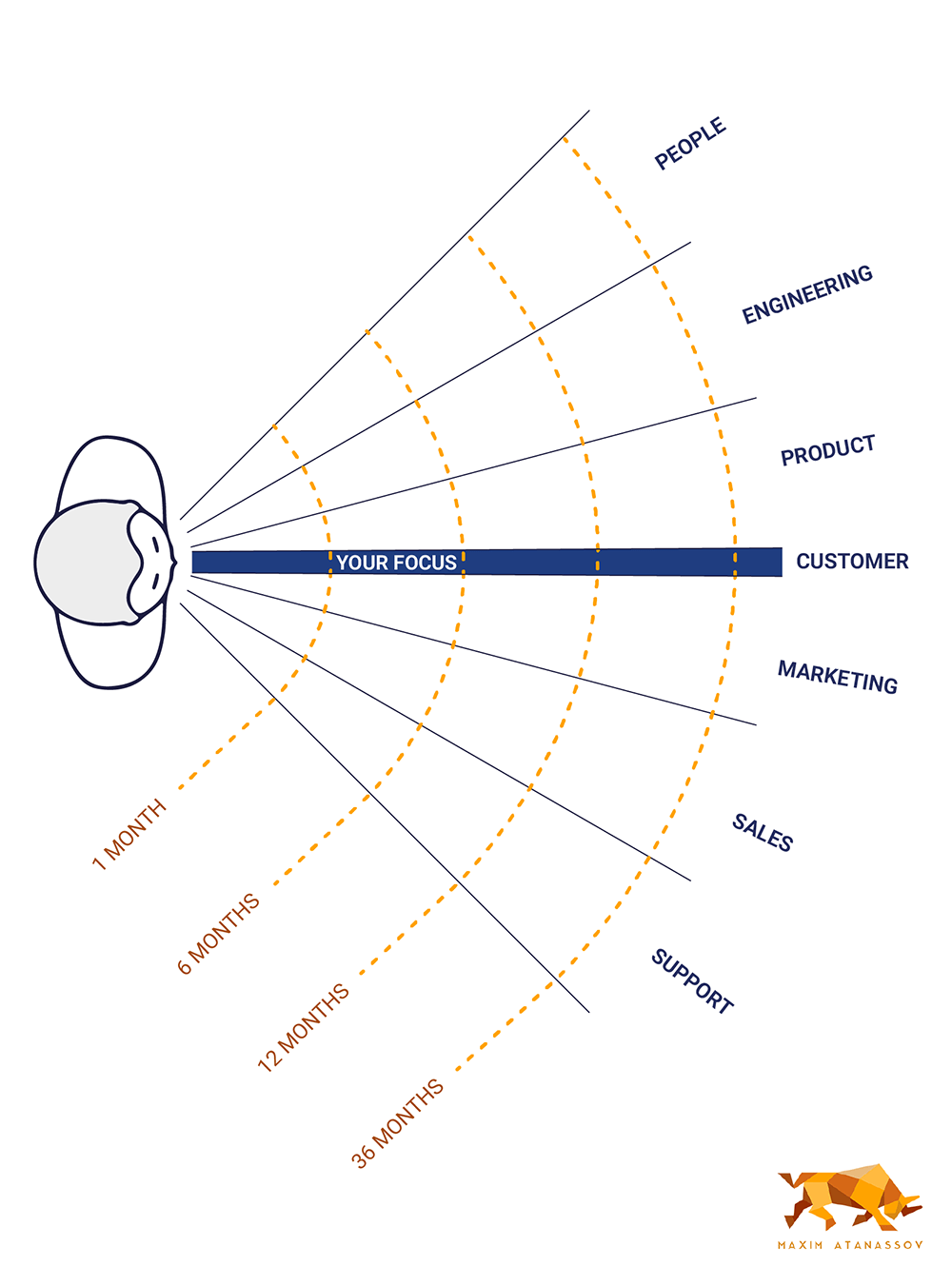HOW TO FIND A BUSINESS MENTOR?
Starting a company is very hard. You have to be comfortable with the unknown. Be able to jump into areas that you don’t have expertise in and figure it out quickly. Or, acquire the expertise externally to help you move forward.
Why do you need a Business Mentor?
As the saying goes, “there is no substitute for experience”. Therefore, if you do not have a lot of experience in a given area, you may not know what decision to make or at the very least want to sound board and check your thinking and decisions with an external, independent party.
That is why it is always advisable to have a person by your side who has already fought the same battles. A person who can bring her/his experience and knowledge to help you see what lies around the corner and evaluate a decision with all risk factors in mind.
A Business Mentor will be your greatest ally, not only to develop your leadership capabilities and elevate your performance in the role but also to further develop your business. With a mentor, you can lay the guard down, s/he is not a Director and is not evaluating your performance.
However, finding and choosing a Business Mentor is no easy task. It must be someone you trust, someone that has the right experience, someone that can commit the time to see you succeed.
In this article, we will not only talk about the ideal characteristics that a Business Mentor should have but also explain
what are the benefits to your business to partner with a business advisor, and
what are the steps to do it.
What is Business Mentoring?
Business mentoring is a relationship between you and a person with extensive experience and expertise in a given area: be it running or scaling a business, subject matter, domain area or core skills expertise. This person will offer you advice, guidance and support in the different phases of your business.
Meetings with a mentor can be
face-to-face,
video calls or
a combination of both. The key is that each of these meetings gets you closer to your defined goals and objectives. A good mentor will work with you on establishing your goals and objectives and keep you accountable to execute to the achievement of the same.
What are the differences between a Business Mentor and a Business Coach?
Although they may seem to be the same thing, and can sometimes be confused with each other, the reality is that there are some major differences between a Business Mentor and a business coach:
- The biggest difference is that a Business Mentor focuses primarily on the mentee, the “racecar driver” and not the racecar. Strategy cannot succeed without culture and execution. Business coaches, on the other hand, primarily focus on the developing and and optimizing the business.
- Another big difference is the time they can work with you. If you have a good relationship with a Business Mentor, they can help you throughout the life of your business. On the other hand, business coaches usually set a limit of 1 year.
- Also, while Business Mentors are most driven by the development of the mentee, business coaches are driven by the performance of the business.
But the lines are often blurred. How do you separate the leader from the business? They are so often intertwined that Business Mentors from time to time guide business decisions and business coaches focused on the individual to drive the achievement of a business outcome.
What are the characteristics of a good Business Mentor?
While finding a Business Mentor may seem easy, it's much harder than you think. If you want to forge a long-term relationship with a Business Mentor that can help you scale new heights and be successful here are some of the characteristics that they should possess:
1. Enthusiasm
One of the main characteristics to look for in a Business Mentor is the enthusiasm to help. The best mentors will let you know through their actions and commitments to you that they are truly excited to see you grow and succeed. They derive gratification from your success. It is their way of driving impact on those around them.
2. Active Listening
A Business Mentor is not an expert in everything. S/he may not know the market that you are in or the domain in which you specialize. A good Business Mentor is not someone who is set in her/his ways and ideas but one that asks insightful questions that leverage your own knowledge and thinking to get to the right answers. There is a mastery to be a good listener and to ask the right questions.
3. Honest Feedback
A good mentoring relationship is forged based on trust and empathy. For that reason, a good Business Mentor should collaboratively work with you to arrive at the actions that you should take to improve. A mentor tells you what you need to hear and not what you want to hear.
There is nothing more caring than providing radical candour. But while this sounds simple, it is not. The ways in which feedback is given are also important. A Business Mentor should help you see the “so what” and unlock the value behind a desired change. Instead, the feedback should be focused on preventing certain mistakes, or implementing actions to help correct them. They often roleplay with you specific conversations to help you get through difficult situations.
4. Accountability
Developing a close relationship over time is inevitable. But a good mentor is the one that keeps the mentee accountable to:
- Send the agenda in advance
- Come prepared for the conversation
- Define actions and outcomes
- Provide updates on progress
- Recognize and celebrate progress.
5. Great Motivator
Entrepreneurship is like a rollercoaster with lots of highs and lots of lows. A Business Mentor should be someone who can motivate you to set new goals for yourself and for the company through association. A great mentor is like a mirror for her/his mentees in which they can reflect themselves to and learn from the experience of the mentor.
Steps to find a Business Mentor
1. Characteristics of your ideal mentor
While we already talked about the ideal characteristics that a Business Mentor should have, you should also think about what characteristics are best suited to your type of startup. Some aspects you should consider are:
- What is the market in which your Business Mentor should have the most experience?
- Are you looking for someone who has experience managing companies, expert in a specific domain or a leadership coach?
- How often do you want to have meetings with your mentor?
- Do you want to work with a person with whom you can have face-to-face meetings, or do you prefer
virtual meetings?
2. Identify your potential mentor
Knowing where you are going helps you get there faster. Knowing what kind of mentor you are looking for is a very important step, but so is knowing who your potential mentors are. Nowadays, there are different resources you can use to get in touch with potential Business Mentors:
- Your own network
- Personal or professional referrals
- Professional associations
- Accelerators
- Thought leaders in your industry
As you find Business Mentors who might be a good fit for you, we advise you to add them to a list, as this will be a great help in the next step.
Refer to the Business Mentorship Programs and Organizations article for a list of potential programs in Canada.
3. Contact potential mentors
This step is very important, as it will determine whether a Business Mentor will want to work with you or not. Research, research research. Then ask a friend or a business acquaintance for a referral. A warm referral is far more likely to open doors. If that is not possible, our advice is to do it the old school way, pick up the phone and call. You are far more likely to create engagement and gauge sentiment over a call than over email. Entrepreneurs usually receive hundreds of emails per day. Therefore, do whatever it takes to stand out, in a good way.
Contacting them through social networks to coordinate a meeting is an option. LinkedIn or Twitter remain the two best options. However, to pique the interest of a Business Mentor, and have a real chance of accepting to work with you, you need to take into account certain key aspects:
- Don't bombard them with calls or messages. Chances are they have so many messages that they may not have been able to check yours. A good strategy is to contact them once, then two weeks later and finally once a month.
- Be prepared. Once a potential Business Mentor responds to you, you should be ready to convince him or her that working with you is a good idea, so as not to waste his or her time. A good idea is to have some specific questions ready that he can answer in a meeting.
- Try to adjust to their time. If a potential Business Mentor offers you a specific day and time to meet with you, make every effort to be free at that time. That way, the mentor won't have to fit into your personal schedule.
4. Agree on expectations with your mentor
If an expert agrees to be your Business Mentor, you will have taken a big step towards elevating your performance. But before you can start working together, it's a good idea to discuss some formal details of mentoring:
- What are their expectations of the relationship? What would a successful relationship look like for them?
- How will the mentoring take place? Virtual, face-to-face or a mix of both?
- What media does your mentor usually use?
- What are your and your mentor's expectations
about the mentoring?
5. Maintain the relationship with your mentor
Finding a mentor is great. But the key to successful mentoring is coachability. The Business Mentor is taking you on because they see potential in you. The surest way to destroy a mentoring relationship is to not heed the advice of your mentor and to not be accountable. Here are some tips on how to drive a successful relationship:
- Be flexible, be receptive and pay full attention to the advice. If an expert has decided to work with you,, the least you can do is to heed to the advice he or she gives you.
- Respect is key. Always make sure to stay true to the expectations that have been set before the mentoring begins. It may seem basic, but it can often happen that, because the startup founder has asked for many more meetings than agreed, the Business Mentor decides not to continue with the mentoring.
- Try to add value to the relationship. You should always try to ensure that he or she can also
take away something of value from the mentoring. Give back generously, every chance you get.
Final Thoughts
Finding a Business Mentor is hard work but they could be a catalyst for success. Remember that maintaining the relationship with your Business Mentor is as important, if not more important, than finding him or her. Therefore, you should be respectful, be curious, be coachable and always deliver on your commitments. And, give back generously. This way, both of you can build a mutually beneficial relationship.
Share
Serial entrepreneur, tech founder, investor with a passion to support founders who are hell-bent on defining the future!
I love business. I love building companies. I co-founded my first company in my 3rd year of university. I have failed and I have succeeded. And it is that collection of lived experiences that helps me navigate the scale up journey.
I have found 6 companies to date that are scaling rapidly. I also run a Venture Studio, a Business Transformation Consultancy and a Family Office.

Drive positive impact and change for the world around you.
QUICK LINKS
MaximAtanassov.com © 2023

